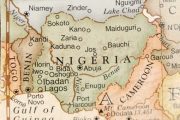
A devastated Robert Horner couldn’t contain his grief and disgust in a recent interview with South African news broadcaster eNCA. Robert’s 21-year old son, Brendin, was brutally murdered on October 1 in the small Free State farming town of Senekal in South Africa. His bloody body was discovered in an open plot on DeRots farm — two days after the murder had taken place — with multiple head and torso injuries and tethered by the neck to a fence post. It is believed that he was stabbed several times and beaten severely before being strangled.
Brendin and his father, Robert — both farmers in the employ of local farm owner Gilly Scheepers — desired nothing more than to eke out an honest living. Robert described his son as hardworking, and Brendin was helping his dad with some car troubles that fateful day in October. After helping Robert with the car, Brendin supposedly left the farm at 7 p.m. — never to venture beyond the gates. The following morning, Robert notified the police when he learned that his son hadn’t made it home.
Suspects Sekwetje Isaiah Mahlamba and Sekola Piet Matlaletsa were apprehended shortly thereafter in Fateng tse Ntho in Paul Roux, their bloody clothes and shoes taken for forensic testing. Police stated that they are confident about the arrest of these suspected stock thieves since, in addition to the forensic evidence, they have two witnesses placing them at the scene of the crime. One of the witnesses has even been threatened by the family of one of the suspects. Further testing of blood samples that were taken from the victim’s abandoned Toyota Hilux revealed the likelihood of a third suspect. Consequently, Senekal’s Police Captain Gerhardus Myburgh requested that the state deny the suspects bail.
Following the arrest, Mahlamba and Matlaletsa’s lawyers requested at least two days from the court to cross-examine Captain Myburgh. Emotions raged outside the courthouse before furious Senekal farmers stormed the building with the hope of seizing the suspects and avenging the torture and murder of their young counterpart. In addition, two men were arrested after a group of protesters overturned and torched a police vehicle in the outside parking lot. Police used stun grenades to disperse the crowd, many of whom were carrying placards that read “Boer Lives Matter.” Mahlamba and Matlaletsa appeared briefly in court for the first time on October 6, yet their “not guilty” plea was heard in the postponed arraignment on October 16. While Mahlamba remains in jail on account of his bail application being dismissed, Matlaletsa was recently granted bail per order of Magistrate Deon van Rooyen on October 22.
On October 13, police and state security ministers, Bheki Cele and Ayanda Dlodlo, interacted with devastated Free State farmworkers and owners at the Meets Agricultural Hall outside Bethlehem. The farming community handed the ministers a memorandum detailing their grievances and alleging police involvement in local criminal activities. The ministers also visited the Horner family to pay their respects, committing to securing justice for Brendin. This poses the question: Will farm murders finally receive the attention they need and, in so doing, free the rural community from the criminal siege they are subjected to daily?
It’s outrageous to think that Robert Horner’s reported words, “Why didn’t they fetch me? I’m an old man,” indicate a mindset that has become prevalent and acceptable in the white farming communities of South Africa. Is it really any more palatable for an older person to be brutally murdered for no legitimate reason? Several media channels in South Africa are inferring that this crime was one of convenience — the elimination of a witness — not the heinous crime of hate that evidence would suggest. However, logical thinking should dictate that torturing before beating a victim to death is excessive for a crime motivated by mere convenience. Even President Cyril Ramaphosa would sound ludicrous in suggesting that this crime was one of those he deems motivated by opportunity.
Given the formidable challenges that currently face white South African farmers, is it any surprise that they’re exiting the country as opportunity presents itself?
It seems that South African agriculture is set to follow the trend of the greater African continent. According to the United Nations Food and Agricultural Organization, Africa has the potential to be a major global food supplier, with roughly 874 million hectares of its land considered suitable for agricultural production. Grow Africa reports that the continent contains 60 percent of the entire world’s arable land area. Ironically, however, sub-Saharan Africa was home to more than half the Earth’s acutely food-insecure people in 2018 — with numbers escalating recently as a result of the COVID 19 pandemic. Little wonder Africa remains the highest worldwide net food importer per capita.





